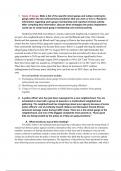Summary
Summary PYC2602 Exam Study Pack
- Institution
- University Of South Africa (Unisa)
These are important revision summary notes to be studied in conjunction with the other study materials. This will save you much needed time in your studies which you can allocate to other modules. These are the kind of revision materials that helps you finish your degree quicker. It worked for me a...
[Show more]






